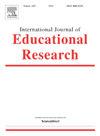正负平衡:中国老年人对网络学习的辩证理解
IF 2.5
3区 教育学
Q1 EDUCATION & EDUCATIONAL RESEARCH
引用次数: 0
摘要
老年人在线学习是在社会转型、信息技术和数字媒体的推动下发展起来的。以往的研究主要关注老年人在线学习的要素、过程和改进,而老年人对在线学习的理解尚未有系统的报道。遵循定性研究范式,在中国中部一所老年学校对18名老年人进行了非结构化访谈。在辩证思维和学习理论的启发下,构建了揭示老年人在线学习认知的理论框架。在演绎和归纳编码的基础上,对两个类别和六个主题的研究结果进行了动态识别,并在中国社会语境中进行了解释。总的来说,辩证的理解平衡了老年人对在线学习的积极和消极结果。具体而言,人机交互的学习模式、自由的学习时间和空间、充足的学习资源是老年人对在线学习的积极理解。网络接入障碍、师生对话不足、学习效果不显著是老年人对网络学习的消极认识。上述受访者的积极和消极理解,为增加中国老年人对在线学习的辩证理解的新知识提供了有力的证据。此外,研究结果为探索、验证和构建老年人在线学习的理论框架提出了一个独特而开创性的“答案”。最后,探讨并构建了优化老年人在线学习理解、消除人口老龄化危机的实践见解和政策启示。本文章由计算机程序翻译,如有差异,请以英文原文为准。
Balancing positive and negative: A dialectical understanding of Chinese older adults toward online learning
Online learning for older adults has been developed and driven by social transformation, information technology, and digital media. Previous research has focused on examining the elements, processes, and improvements of online learning for older adults, while older adults’ understanding of online learning has not been systematically reported. Adhering to the qualitative research paradigm, eighteen older adults were interviewed in an unstructured at an older adult school located in central China. Inspired by dialectical thinking and learning theory, a theoretical framework for revealing older adults’ understanding of online learning was constructed. Based on deductive and inductive coding, the findings of two categories and six themes were dynamically identified and interpreted in the Chinese social context. Overall, a dialectical understanding balances older adults’ positive and negative results towards online learning. Specifically, the human-computer interaction learning mode, free learning time and space, and sufficient learning resources are positive understandings of online learning for older adults. Network access barriers, insufficient teacher-student dialog, and insignificant learning effects are the negative understanding of older adults toward online learning. The above respondents’ positive and negative understandings provide strong evidence for adding new knowledge about Chinese older adults’ dialectical understanding of online learning. In addition, the findings put forward a unique and groundbreaking ‘answer’ for exploring, validating, and constructing a theoretical framework of online learning for older adults. Furthermore, practical insights and policy implications on optimizing older adults’ understanding of online learning and eliminating the crises of population aging are discussed and constructed.
求助全文
通过发布文献求助,成功后即可免费获取论文全文。
去求助
来源期刊

International Journal of Educational Research
EDUCATION & EDUCATIONAL RESEARCH-
CiteScore
6.20
自引率
3.10%
发文量
141
审稿时长
21 days
期刊介绍:
The International Journal of Educational Research publishes regular papers and special issues on specific topics of interest to international audiences of educational researchers. Examples of recent Special Issues published in the journal illustrate the breadth of topics that have be included in the journal: Students Perspectives on Learning Environments, Social, Motivational and Emotional Aspects of Learning Disabilities, Epistemological Beliefs and Domain, Analyzing Mathematics Classroom Cultures and Practices, and Music Education: A site for collaborative creativity.
 求助内容:
求助内容: 应助结果提醒方式:
应助结果提醒方式:


